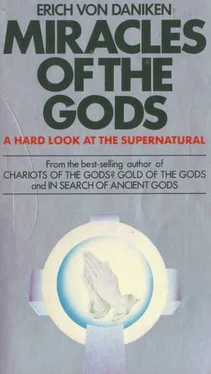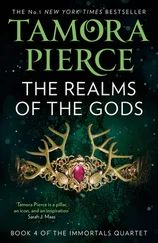Erich Daniken - Miracles of the Gods
Здесь есть возможность читать онлайн «Erich Daniken - Miracles of the Gods» весь текст электронной книги совершенно бесплатно (целиком полную версию без сокращений). В некоторых случаях можно слушать аудио, скачать через торрент в формате fb2 и присутствует краткое содержание. Жанр: Физика, на английском языке. Описание произведения, (предисловие) а так же отзывы посетителей доступны на портале библиотеки ЛибКат.
- Название:Miracles of the Gods
- Автор:
- Жанр:
- Год:неизвестен
- ISBN:нет данных
- Рейтинг книги:4 / 5. Голосов: 1
-
Избранное:Добавить в избранное
- Отзывы:
-
Ваша оценка:
- 80
- 1
- 2
- 3
- 4
- 5
Miracles of the Gods: краткое содержание, описание и аннотация
Предлагаем к чтению аннотацию, описание, краткое содержание или предисловие (зависит от того, что написал сам автор книги «Miracles of the Gods»). Если вы не нашли необходимую информацию о книге — напишите в комментариях, мы постараемся отыскать её.
Miracles of the Gods — читать онлайн бесплатно полную книгу (весь текст) целиком
Ниже представлен текст книги, разбитый по страницам. Система сохранения места последней прочитанной страницы, позволяет с удобством читать онлайн бесплатно книгу «Miracles of the Gods», без необходимости каждый раз заново искать на чём Вы остановились. Поставьте закладку, и сможете в любой момент перейти на страницу, на которой закончили чтение.
Интервал:
Закладка:
Did they think that Jesus was temporarily sub-normal? (Today psychology could give a plausible reasons for this.) The master did not want to have anything to do with his mother and brethren who were asking for him outside. Dismissing them, he put the rhetorical question: 'Who is my mother, or my brethren?' (33) only to answer it in general terms:'... whosoever shall do the will of God, the same is pay brother, and my sister, and my mother!' (34). We cannot find any feeling here of gratitude to the mother who had brought him into the world in ticklish circumstances.
John baptized in the Jordan, where people flocked to him. To all of them he preached: '... the baptism of repentance for the remission of sins' (1:4). We know - it occurs; later in Mark - that Jesus followed this appeal and was baptized. Surely we should ask: the Son of God have sins to forgive?
Contradictions due to the distance in time and the antiquity of the texts are excusable. But when they succeed each other in the same breath, it takes theological gymnastics to explain them. According to Mark, Jesus says to his disciples: 'Unto you it is given to know the mystery of the kingdom of God; but unto them that are without, all these things are done in parables' (4:11), which is as much as to say: You, my friends, understand my every word, but I have to explain things to the people in parables.
Already in verse 13, he is angry with his disciples because they do not understand a parable: 'Know ye not this parable? and how then will ye know all parables?'
It is open to question whether the apostles ever understood exactly what Jesus meant. According to Matthew (13:11), Jesus said.'... it is given unto you to know the mysteries of the Kingdom of heaven, but to them it is not given.' He raises the disciples above the others who do not understand him, because 'blessed are your eyes, for they see: and your ears, for they hear' (16). Hence we must assume that communication in the inner circle was so immediate that the code in which Jesus spoke every day was understood. Not a bit of it! Even the learned Peter had to ask: 'Declare unto us this parable' (15:
15). Jesus asks in astonishment: 'Are ye also yet without understanding?' (16). Did they understand
'God's word' or not? Presumably not, for even after the Resurrection, when they could not ask the master for further explanations, John says that the disciples did not understand.
Mark relates that John had told Jesus that the disciples had seen a man casting put devils in the holy name and that they had forbidden him to do so (9:38). Jesus readily answered: 'Forbid him not: for there is no man which shall do a miracle in my name, that can lightly speak evil of me' (39). This is put differently in Matthew. In his gospel, others have prophesied, driven out devils and acted in Jesus'
name (7. 22). Then comes the typically demagogic answer: 'And then I will profess unto them. I never knew you: depart from me, ye that work iniquity' (23). Those may be the methods of the maquis - but it is not worthy of God to give people tasks only to deny their existence later.
It is not made easy for the Christian layman to find his way through the thicket of contradictions in the New Testament. It is simpler for informed theologians: they doubtless have a hot line over which they can get information from the highest source. Through their mouths and again through the mouths of those they teach, children in religion classes and believers in church learn how everything is to be understood and how it may on no account be interpreted. If only the theologians were united on the subject! But, depending on their membership of a particular church they get in each other's hair, violently, angrily, hotly in favour of their own angle. And anything that cannot be brought under one head and is completely inexplicable is inflicted on 'those who are without' as a test of faith. How does it go? 'Let your communication be yea, yea; nay, nay.'
In the revelation of the holy word it is said that Jesus is the only begotten son of God, and that he admitted as much at a hearing before the High Council. In fact the correct translation of Jesus' remark is not: 'I am', but 'Thou sayest so'. It is twist-ing reason not to understand what is meant, namely: I have never claimed it, you have attributed it to me! In Mark we also read: 'And Jesus said unto him, why callest thou me good? there is none good but one, that is, God (10:18). Jesus clearly points out the he is not God, but of course, he did not know what the decrees of the Councils would soon make out of him.
Opposed to the dogmas that Father and Son are 'one', and the trinity of Father, Son and Holy Ghost, is an honest confession by Jesus: 'But of that day and that hour knowest no man, not the angels which are in heaven, neither the Son, but the Father' (Mark 13:32). If they had been 'one', each one of them would have been informed of the day and hour of a distant event.
The High Priests condemned Jesus - for they found no other reason - because he had 'blasphemed'
God. The High Priests asked whether he was Christ, the Son of God.
The answer according to Matthew (26:64): 'Thou hast said.'
The answer according to Mark (14,62): 'I am.'
The answer according to Luke (22:70): 'Ye say that I am.'
The contradictions of the evangelists are understandable, none of them was present at the trial; they are merely reporting rumours.
John gives rather more detailed information. Jesus defended himself before the High Council: 'I ever taught in the synagogue, and in the temple, whither: Jews always, resort: and in secret have I said nothing (18:20). Presumably that was only half the truth, the defence of a rebel. Perhaps the Council also knew about some subversive activity of Jesus, as Matthew hints: 'What I tell you in darkness, that speak ye in light, and what ye hear in the ear, that preach ye upon the housetops' (10:27). Rebels have been convicted in all ages for subversive activity. Perhaps the reason for the accusation is to be sought here?
The evangelists come to the unanimous conclusion that Jesus was arrested without grounds. The High Priests and Council did their best to find charges: 'And the chief priest and all the council sought for witness against Jesus to put him to death: and found none' (Mark 14:55).
Until now it has not been explained what damaging information Judas could really have betrayed. He does not report at any stage of the trial, is not present at any hearing, nor does he appear as a witness for the prosecution. It does come out that the elders paid him thirty pieces of silver. What for? For the identification of a man who was known all over the town. But had he, and there the affair becomes and remains inexplicable, given concrete grounds for accusation in addition to the kiss of betrayal, the authorities would not have been so helpless. Furthermore, Judas would certainly not have turned traitor for thirty pieces of silver. There must have been something else involved that we shall never know about. Judas could easily come by money, much more than thirty pieces of silver. Just as the Essenes had their communal life organized with a central fund, Judas looked after the money for Jesus'
group. No, there must have been something more to it.
Sentence and execution remain shrouded in mystery.
Jesus was handed over to Pontius Pilate, who considered him innocent, but had him crucified in the end. According to St. John, the governor defended himself: 'Take ye him, and crucify him: for I find no fault in him' (19:6). The Roman governor had been in the country long enough to know that Jews would not crucify anybody. Crucifixion was a Roman form of execution, so his offer was meaningless.
The Jews obstinately went on: 'We have a law, and by our law he ought to die, because he made himself the Son of God' (7). Why should the Romans worry about that? Religious disputes did not interest them. Nevertheless, John asserts: 'When Pilate therefore heard that saying, he was the more afraid' (8). What was he afraid of? He possessed the military and political power and was in charge of the police force. He said as much to the silent Jesus: 'Knowest thou that I have power to crucify thee, and have power to release thee?' (10). So why on earth should he be afraid? Pilate ruled so despotically that he was recalled later. If he had really considered Jesus innocent, he could have released him in spite of the Jewish protests. Since a crucifixion subsequently took place, he must have had political grounds, and as we know political grounds are often left unmentioned.
Читать дальшеИнтервал:
Закладка:
Похожие книги на «Miracles of the Gods»
Представляем Вашему вниманию похожие книги на «Miracles of the Gods» списком для выбора. Мы отобрали схожую по названию и смыслу литературу в надежде предоставить читателям больше вариантов отыскать новые, интересные, ещё непрочитанные произведения.
Обсуждение, отзывы о книге «Miracles of the Gods» и просто собственные мнения читателей. Оставьте ваши комментарии, напишите, что Вы думаете о произведении, его смысле или главных героях. Укажите что конкретно понравилось, а что нет, и почему Вы так считаете.











